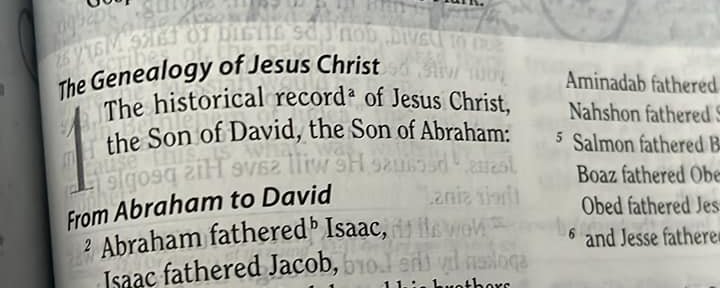Let's Begin at the Beginning
Matthew chapter 1
"This is the genealogy of Jesus the Messiah, the son of David, the son of Abraham..."
From Abraham to the Messiah, by his seed (Abraham's), some 42 generations later, the birth of Jesus Christ (the Messiah) came to pass. Jesus' earthly father Joseph, the descendant of king David by the line of David's son Solomon, bore the genealogy of a cursed royal line because of Jeconiah. And yet Luke looks to Jesus as the son of Mary who traces her lineage from Nathan the son of king David, though Nathan is not of the kingly line, but he's also not cursed by the sin of Jeconiah. It seems that Jeconiah birthed quite a bit of trouble, I'm thinking about his grandchild Zerubbabel who was particularly problematic. Looking back to the minor prophets we've recently studied, maybe we'll recall, that Zerubbabel tried to lead a messianic movement for himself. Whether or not he did indeed try to lay claim to Messiah status is a little unclear, but he was indeed involved in the coming of Christ. Both Matthew and Luke list this Babylonian-born, Persian-appointed governor of Judah as the forefather of Joseph, the adoptive father of Jesus (see Matthew 1:12-13 and Luke 3:27).
But all this generational intrigue aside, what's the point we're to take away from this first chapter of Matthew?
I believe this verse boils it down nicely...
Matthew 1:16
"and Jacob the father of Joseph, the husband of Mary, and Mary was the mother of Jesus who is called the Messiah."
...Joseph accepted his adopted son as the Messiah. As did Mary his mother. This is the importance of Matthew chapter one. The facts are presented, and the witness's testimony is given for one purpose. To make the case that Jesus is the Christ, the long-anticipated Messiah.
Matthew begins his gospel by making a claim that Jesus is the Christ, the Son of David, and the Son of Abraham. Matthew is saying that Jesus is the theme of ALL the scriptures. That he is the fulfillment of all scripture. That everything written in all sixty six books of the Bible are having to do with Jesus the Christ, king of the universe. They are his words. Every book in the Bible are his words. The entire Bible is his. He is The Word of The Lord.
Jesus said, all the things written in the prophets "must be fulfilled."
Luke 24:44
Then he said, “When I was with you before, I told you that everything written about me in the law of Moses and the prophets and in the Psalms must be fulfilled.”
And he is eternal and so are his words...
Matthew 24:35 Jesus says...
"Heaven and earth will disappear, but my words will never disappear."
Matthew claims in chapter one that Jesus has been uniquely anointed by God for the work of salvation, the work of the Messiah. But more than that, Matthew makes the case that Jesus is the culmination of all scripture, the fulfillment. He makes the case that Jesus is the beginning and the end. Matthew ties together all the scripture in Jesus, and therefore Jesus gives meaning to the Old Testament as a whole and to every event and passage found within all scripture.
Matthew does this because he's inspired and instructed by the Holy Spirit. And he was uniquely qualified to take on this task. As a former tax collector, and a Levite, Matthew was qualified to write an account of Jesus’ life and teachings. He would know the Greek language, he'd be literate, and probably a well-organized person. It is thought that Matthew was the scribe among the disciples and that he took notes about the ministry of Jesus, and his teachings.
Most New Testament scholars believe that the Gospel of Matthew was not the first of the four gospels written, but there is good reason to believe that Matthew had in his possession a very good firsthand record of all that had transpired during Jesus's three year ministry, and more importantly the words of Jesus recorded firsthand.
The Gospel of Matthew is deeply rooted in Judaism. But to say that Matthew is “pro-Jewish” would be incorrect. What we learn from Matthew is that he is “pro-Jesus", or "pro-Jewish Messiah". Matthew's gospel is distinctly Jewish in nature. For instance, Matthew uses the more Jewish phrase “Kingdom of Heaven” instead of “Kingdom of God.” Matthew refers to Jewish customs without explanation, and assumes the reader knows the Hebrew roots of many of the events he recorded in his gospel.
Matthew doesn't just focus on the male lineage of Jesus. Matthew includes notable women like Tamar, Rahab, Ruth, and Bathsheba (Uriah's wife). Matthew's gospel is known for its focus on ethical teachings (e.g., the Sermon on the Mount), so it's a fun ride to examine closer the significance of these women in the light of this patriarchal society. The inclusion of women stands out as a profound symbol of God's redemptive plan. Each woman listed in Matthew's narrative resonates with themes of faith. Their decisions and actions show the unexpected ways that God works through all of humanity. I encourage you to take a closer look back into that family history of Jesus.
Matthew chapter one takes us from the significance of Jesus’ ancestors to the profound implications of His divine origins. He lays the historic foundation for the Christian faith. He begins the journey and helps us to discover how Jesus' words reveal God’s perfect plan for our salvation. And maybe as significant is the fact that Jesus is the fulfillment of ALL scripture.
Matthew chapter one doesn’t just focus on Jesus’ family tree; he also shares the miraculous account of His birth. Born of the Virgin Mary through the power of the Holy Spirit, Jesus, Immanuel – “God with us.”
But that's for the next devotion/article. Stay tuned.
See This Article On X - https://x.com/MICAH_SIXEIGHT/status/1835653078613172464




















